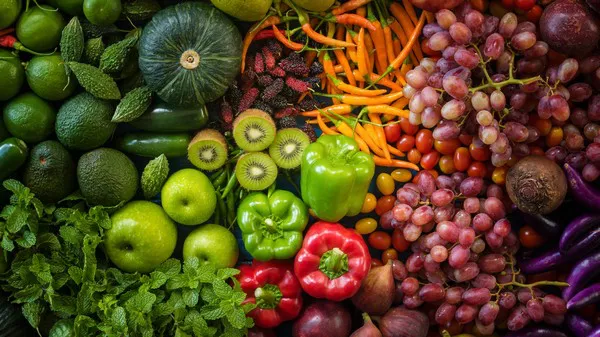Vitamin K, a fat-soluble nutrient, is essential for various bodily functions, including blood clotting, bone health, and cardiovascular health. Understanding the dietary sources of vitamin K is crucial for maintaining overall wellness. This article explores the significance of vitamin K, its different forms, recommended daily intake, and an extensive list of foods rich in this vital nutrient.
SEE ALSO: Which Vitamins are Fat-Soluble: A Complete Overview
The Significance of Vitamin K
Vitamin K plays a critical role in several physiological processes, with its primary functions revolving around blood coagulation and bone metabolism. There are two main forms of vitamin K: K1 (phylloquinone) and K2 (menaquinone). Vitamin K1 is primarily associated with blood clotting and is found in green leafy vegetables. On the other hand, vitamin K2 contributes to bone health and can be synthesized by gut bacteria in addition to dietary sources.
1. Blood Clotting
Vitamin K’s role in blood clotting cannot be overstated. It aids in the synthesis of various proteins, such as prothrombin and clotting factors, that are vital for the coagulation process. Without sufficient vitamin K, the body’s ability to stop bleeding effectively is compromised, leading to an increased risk of excessive bleeding and hemorrhage.
2. Bone Health
Vitamin K also influences bone metabolism. It helps regulate calcium deposition in bones and prevents calcium from accumulating in arteries and soft tissues. Vitamin K2, in particular, activates proteins that direct calcium to the bones, promoting bone density and strength. As a result, a deficiency in vitamin K can contribute to an increased risk of osteoporosis and fractures.
SEE ALSO: 8 Essential Vitamins Good for Skin Health
Recommended Daily Intake of Vitamin K
The recommended daily intake of vitamin K varies depending on age, sex, and life stage. For adults, the general recommendation is as follows:
Men: 120 micrograms (mcg) per day
Women: 90 mcg per day
It’s important to note that these values are approximate and can vary by country and health organization. Pregnant and lactating women, as well as individuals on certain medications, might require adjusted intake levels. Consulting with a healthcare professional is advisable to determine specific dietary needs.
SEE ALSO: How Many Vitamins Can You Take a Day? An Ultimate Guide
Foods Rich in Vitamin K
A well-balanced diet can provide ample vitamin K, particularly when incorporating foods from various sources. Here is a comprehensive list of foods high in vitamin K:
1. Green Leafy Vegetables
Dark, leafy greens are some of the richest sources of vitamin K1. Incorporate spinach, kale, collard greens, Swiss chard, and broccoli into your diet to boost your vitamin K intake.
2. Herbs
Fresh herbs not only enhance the flavor of dishes but also provide a significant dose of vitamin K. Parsley, basil, thyme, and cilantro are excellent choices.
3. Cruciferous Vegetables
Cabbage, Brussels sprouts, and cauliflower are members of the cruciferous vegetable family, offering both vitamins K1 and K2.
4. Natto
A traditional Japanese dish made from fermented soybeans, natto is one of the best sources of vitamin K2.
5. Fermented Foods
Certain fermented foods like sauerkraut and fermented cheeses contain vitamin K2, thanks to the bacteria involved in the fermentation process.
6. Animal Liver and Meat
Liver, especially from animals like beef and chicken, is a source of vitamin K2. Lean meats also contain smaller amounts.
7. Fish
Fatty fish like salmon, mackerel, and sardines provide vitamin K2 along with heart-healthy omega-3 fatty acids.
8. Dairy Products
Some dairy products, such as hard cheeses, have notable amounts of vitamin K2.
9. Eggs
Egg yolks contain vitamin K2, making them a versatile source of this nutrient.
10. Plant Oils
Certain plant oils, including soybean oil and canola oil, contain vitamin K1.
Factors Affecting Vitamin K Absorption
While consuming vitamin K-rich foods is crucial, factors affecting absorption should also be considered:
1. Fat Intake: Vitamin K is fat-soluble, so consuming it with dietary fat enhances absorption.
2. Gut Health: A healthy gut microbiome is essential for synthesizing vitamin K2. Probiotics and fiber-rich foods can support gut health.
3. Medications: Some medications, like blood thinners, can interfere with vitamin K metabolism. Consult a healthcare provider if you’re on such medications.
4. Cooking Methods: Steaming or lightly cooking vitamin K-rich foods preserves more of the nutrient than intense cooking.
Recipes Particularly High in Vitamin K
Here are a few recipes that are particularly high in vitamin K:
1. Vitamin K-Packed Green Smoothie
Ingredients:
1 cup kale leaves (stems removed)
1 cup spinach leaves
1 banana
1/2 cup kiwi chunks
1/2 cup unsweetened almond milk
1 tablespoon chia seeds
Instructions:
Blend the kale, spinach, banana, kiwi, and almond milk until smooth.
Stir in chia seeds for added fiber and omega-3s.
Enjoy this nutritious smoothie as a breakfast or snack option.
2. Roasted Brussels Sprouts with Garlic
Ingredients:
1 pound Brussels sprouts (trimmed and halved)
2 tablespoons olive oil
3-4 cloves garlic (minced)
Salt and pepper to taste
Instructions:
Preheat the oven to 400°F (200°C).
Toss the Brussels sprouts with olive oil, minced garlic, salt, and pepper.
Spread them on a baking sheet in a single layer.
Roast for about 20-25 minutes or until they’re tender and slightly crispy on the edges.
Serve as a flavorful side dish.
3. Natto and Brown Rice Bowl
Ingredients:
1 cup cooked brown rice
1 serving of natto (follow package instructions)
1 teaspoon soy sauce
Sliced green onions for garnish
Sesame seeds for garnish
Instructions:
Prepare the brown rice according to package instructions.
Prepare the natto as directed on the package.
Mix the natto with soy sauce.
Serve the natto over the cooked brown rice.
Garnish with sliced green onions and sesame seeds.
This Japanese-inspired dish is rich in vitamin K2 and offers a unique taste and texture.
4. Mediterranean Chickpea and Kale Salad
Ingredients:
2 cups chopped kale leaves (stems removed)
1 can (15 oz) chickpeas (drained and rinsed)
1 cup cherry tomatoes (halved)
1/2 cup cucumber (diced)
1/4 cup red onion (finely chopped)
1/4 cup feta cheese (crumbled)
2 tablespoons extra-virgin olive oil
1 tablespoon lemon juice
Salt and pepper to taste
Instructions:
In a large bowl, massage the chopped kale with olive oil and lemon juice for a few minutes to soften.
Add the chickpeas, cherry tomatoes, cucumber, red onion, and feta cheese.
Toss everything together.
Season with salt and pepper to taste.
This hearty salad is a balanced meal rich in vitamin K1 and other nutrients.
Conclusion
Vitamin K’s significance extends beyond its role in blood clotting; it also profoundly influences bone health and cardiovascular wellness. Consuming a diverse range of vitamin K-rich foods ensures an adequate intake of both K1 and K2 forms. From leafy greens to fermented foods, incorporating these nutrient-packed options into your diet can contribute to overall health and vitality. Remember, consulting a healthcare professional for personalized recommendations is key to maintaining optimal vitamin K levels, especially for individuals with specific health conditions or dietary restrictions.
[inline_related_posts title=”Related Topics” title_align=”left” style=”list” number=”3″ align=”none” ids=”1486,1481,1451″ by=”categories” orderby=”rand” order=”DESC” hide_thumb=”no” thumb_right=”no” views=”no” date=”yes” grid_columns=”1″ post_type=”” tax=””]

































